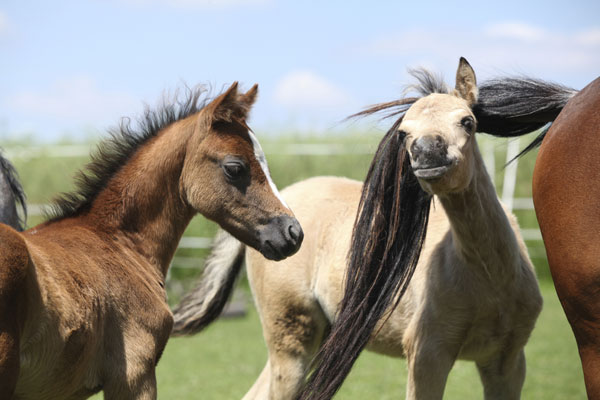“In this study we determined the effect of the foal’s environment on its ability to produce interferon-gamma early in life,” said David Horohov, PhD, Jes and Clementine Schlaikjer Endowed Chair and a professor at the Gluck Equine Research Center at the University of Kentucky.

Interferon-gamma is a key protein in immune response. Interferon-gamma is important to foals because reduced production of it is associated with an increased risk for intracellular bacterial infections, such as pneumonia caused by the bacterium Rhodococcus equi.
Researchers at the University of Kentucky Gluck Equine Research Center recently linked a foal’s environment with its ability to produce interferon-gamma.
The researchers noted that in humans, exposure to microbial antigens in the environment affects interferon-gamma production through the stimulation of white blood cells (lymphocytes). The Gluck Equine Research Center researchers looked at whether the same process occurs in foals.
The research was part of the dissertation project performed by Lingshuang Sun, PhD, while she was a graduate student in Horohov’s laboratory. Horohov’s team had previously found newborn foals are born with a limited capacity to produce interferon-gamma and that production increases after birth. Because interferon-gamma is a key cytokine in the immune response to R. equi, this could explain why adult horses are resistant to this bacterium whereas foals are uniquely susceptible. Increasing interferon-gamma production in foals could prevent mortality and financial losses due to R. equi infections, Horohov said.
The study results showed that foals exposed to higher levels of microbial antigens (bacteria and fungi) had increased interferon-gamma production as well as increased lymphocyte numbers, when compared to foals with low exposure to microbial antigens.
Horohov said this is the first data to actually identify a relationship between environment, increased lymphoproliferation and elevated interferon-gamma expression in foals.
The results showed that a foal’s environment can influence its ability to produce interferon-gamma early in life, and the effect was associated with an increase in the lymphoproliferative response of these foals, noted Horohov. The foals were responding to the microbial antigens, resulting in increased interferon-gamma expression; these data are consistent with the known mechanism of interferon-gamma regulation in other species.
In addition to playing a possible role in resistance to R. equi infection, increased interferon-gamma production early in life could also be associated with a reduced risk for developing other diseases.
“There is good evidence in humans that delayed production of interferon-gamma in children is associated with an increased risk for asthma,” Horohov said. “We don’t know whether this also happens in horses, but it is an intriguing possibility that should be investigated further.”


